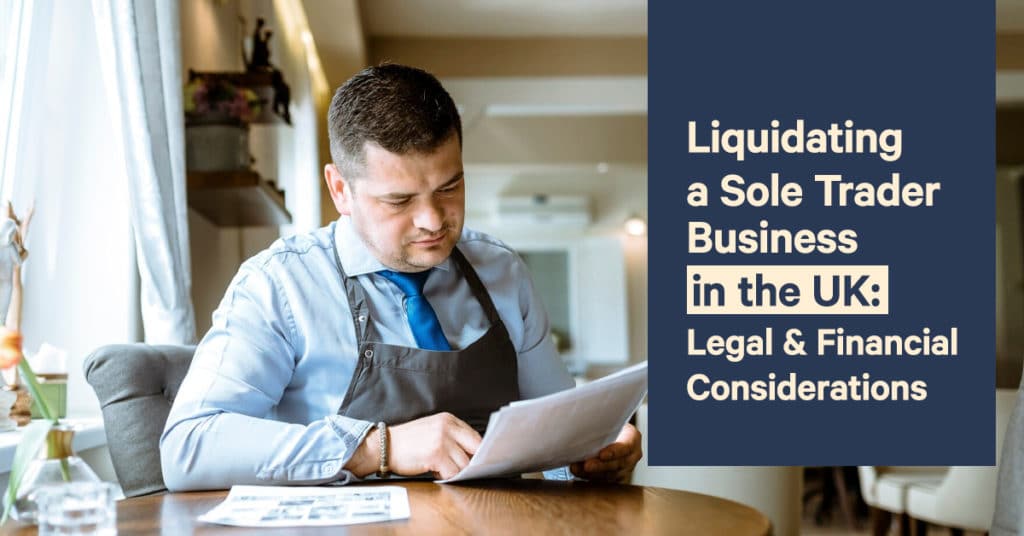Running a sole trader business can be a fulfilling and profitable venture. However, when financial difficulties arise and the business becomes unsustainable, liquidation might be the most sensible option. Liquidating a sole trader business involves selling assets, paying debts, and winding up operations. In this blog, we will discuss the legal and financial considerations of Liquidating a sole trader business, helping you make informed decisions during this challenging time.
Understanding Liquidation for Sole Traders
Liquidation is the process of closing down a business, selling its assets, and using the proceeds to pay off creditors. For sole traders, this process can be particularly complex because the business and the individual are legally considered the same entity. Unlike limited companies, sole traders are personally liable for any business debts. This means that personal assets may be at risk if the business debts cannot be covered by the sale of business assets.
The Process of Liquidating a Sole Trader Business
- Assessing Your Financial Situation: The first step in liquidating a sole trader business is to conduct a thorough assessment of your financial situation. This involves listing all your assets and liabilities, including business debts, and personal debts. It’s crucial to differentiate between business and personal assets, although both might be used to pay off creditors.
- Seeking Professional Advice: Liquidating a sole trader business can be a complex process, and seeking advice from an insolvency practitioner or a financial advisor is highly recommended. They can guide you on the best course of action and help you understand the legal implications of liquidation.
- Informing Creditors: Once you have decided to proceed with liquidation, you need to inform your creditors about your decision. This is a legal requirement and helps ensure all creditors are treated fairly during the liquidation process.
- Selling Assets: The next step is to sell your business assets. This may include equipment, inventory, and any other assets owned by the business. The proceeds from the sale of these assets will be used to pay off creditors.
- Paying Off Debts: After selling the assets, you must use the proceeds to pay off your business debts. If the proceeds are not sufficient to cover all debts, you may need to use personal assets to settle the remaining amount.
- Dealing with Remaining Debts: If, after selling all assets, there are still outstanding debts, you may need to consider other options, such as entering into an Individual Voluntary Arrangement (IVA) or declaring bankruptcy.
- Notifying HM Revenue & Customs: It’s important to notify HM Revenue & Customs about the liquidation of your business. You need to settle any outstanding tax liabilities and submit final tax returns.
Legal Considerations
When liquidating a sole trader business, there are several legal considerations to keep in mind:
- Personal Liability: As a sole trader, you’re personally liable for any business debts. This means that creditors can pursue your personal assets if the business assets are not sufficient to cover the debts.
- Contracts and Agreements: You need to review all contracts and agreements that the business is part of, including leases, supply agreements, and employee contracts. You may need to negotiate the termination of these contracts or fulfil any outstanding obligations.
- Employment Law: If you have employees, you must comply with employment laws during the liquidation process. This includes providing notice, paying outstanding wages, and dealing with redundancy payments.
Financial Considerations
Liquidating a sole trader business also has significant financial implications:
- Asset Valuation: You need to accurately value your business assets to ensure that they are sold at a fair price. This may require the assistance of a professional valuator.
- Debt Repayment: The proceeds from the sale of assets should be used to repay debts in a specific order, as dictated by law. Secured creditors are typically paid first, followed by unsecured creditors.
- Tax Implications: Liquidating a business can have tax implications, including capital gains tax on the sale of assets. It’s important to seek advice from a tax professional to ensure you comply with tax laws and minimise your tax liability.
Help is on hand
Liquidating a sole trader business is a complex process with significant legal and financial implications. It requires careful planning, transparency with creditors, and a thorough understanding of your legal and financial obligations. By seeking professional advice and following the proper procedures, you can navigate this challenging time and work towards a fresh start.
If you’re considering liquidating a sole trader business and need expert guidance, do not hesitate to contact us. Our team of experienced insolvency practitioners at Simple Liquidation is here to help you through every step of the process. Reach out to us via the contact form on our website, through our live chat option, by emailing mail@Simpleliquidation.co.uk, or by calling 0800 246 5895. We’re committed to providing the support and advice you need during this critical time.




